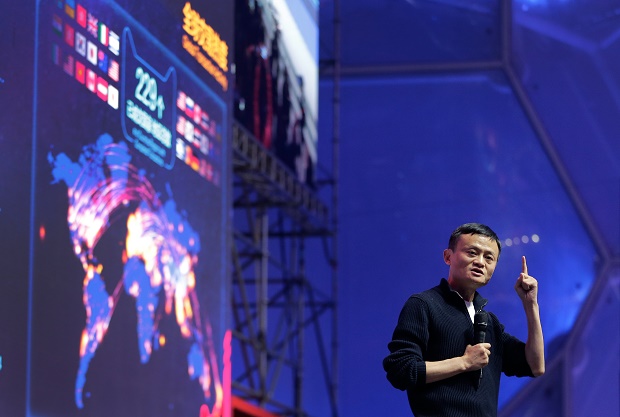
Jack Ma, executive chair of the Alibaba Group speaks in front of a giant screen showing real-time sales figures of e-commerce giant Alibaba, during a press conference for the ‘Singles’ Day’ online shopping festival held at National Aquatic Center, also known as the “Water Cube” in Beijing, China, Wednesday, Nov. 11, 2015. Shoppers spend more than $9 billion within 24 hours during the country’s biggest online shopping holiday, smashing last year’s figure to set a record for a single day of sales. AP
BEIJING, China — Chinese Internet users spent billions of dollars in the planet’s biggest online shopping splurge Wednesday, as “Singles Day” hit new heights, despite slowing growth in the world’s second-largest economy.
The cumulative national bill for the day-long commercial orgy dwarfed Americans’ online spending over the five-day frenzy from Thanksgiving to Cyber Monday last year.
Singles Day is not a traditional Chinese festival, but e-commerce giant Alibaba has been pushing November 11 — a date heavy on ones, the loneliest number — since 2009 as it looks to tap the country’s huge, and expanding, army of Internet shoppers.
It was first marketed as an “anti-Valentine’s Day”, featuring hefty discounts to lure singletons and price-sensitive buyers.
But with sales hitting new highs year after year, it has become a massive — and highly lucrative — business opportunity embraced by the nation’s digital retailers.
Competition for a slice of China’s 668 million Internet users is turning increasingly fierce, and Alibaba kicked off this year’s mammoth event with a television spectacular at Beijing’s Water Cube Olympic swimming venue.
James Bond actor Daniel Craig and Hollywood star Kevin Spacey — in his role as President Frank Underwood from the Netflix series “House of Cards” — were just two of the galaxy of foreign and domestic stars involved.
The company’s efforts paid off in spades. A little over 12 hours after the promotion’s midnight start, sales had already outstripped last year’s $9.3 billion gangbusters effort.
By around 10 p.m., shoppers had splashed out almost $13 billion, according to a company blog.
The figures were “very solid evidence for the power of Chinese consumers”, chief executive officer Daniel Zhang was quoted as saying, adding that when the company started the event “we never dreamed it could be such a huge shopping day”.
In comparison, desktop sales for the five days from Thanksgiving through Cyber Monday in the United States last year stood at $6.56 billion, according to Internet analytics firm comScore.
Another of China’s main online retailers, JD.com, said it had completed over 20 million transactions by around 5 pm. About an hour and a half later, one day orders had passed the combined total of the five previous Singles Days, it wrote on Twitter.
Milking it
Putting all of those purchases into customers’ hands is a huge task. Alibaba said its logistical arm and its partners would use more than 1.7 million personnel, 400,000 vehicles, 5,000 warehouses and 200 planes to handle deliveries.
Buying on that scale has had a ripple effect outside of China. Australian company Bellamy’s had to apologize to customers Down Under after supermarket shelves there were stripped bare of milk powder, a shortage, the company said on Facebook, that was due to Chinese demand.
Writing on Twitter, JD.com said orders for imported milk were up 500 percent on 2014.
Singles Day has received vocal support from the government at a time when China’s economic expansion is slowing and Beijing is trying to transform its growth model into a more sustainable one driven by consumption.
Chinese Premier Li Keqiang’s office phoned Alibaba chairman Jack Ma hours ahead of the promotion, “congratulating and encouraging the creation and achievement of the 11.11 event”, said a post on a social media account of Tmall, the group’s business-to-consumer arm.
The mega-spending spree came as the government announced industrial output growth had fallen to 5.6 percent in October, a six-month low, highlighting the need for the transition to consumer spending.
The figure is the latest indicator that China’s expansion is slowing after years of breakneck growth.
But Chinese Internet users were more interested in their new acquisitions than government policy — although many lamented that they had spent far too much money.
“I can only afford to eat dirt for the next half year,” said a user on Sina Weibo, with an attached screengrab of a Taobao app showing she had bought 42 items.
Some consumers also expressed concerns about China’s notorious fakes.
“Good luck. Hope you guys will not get phony products or things that turn out to be useless,” said a Weibo user.

